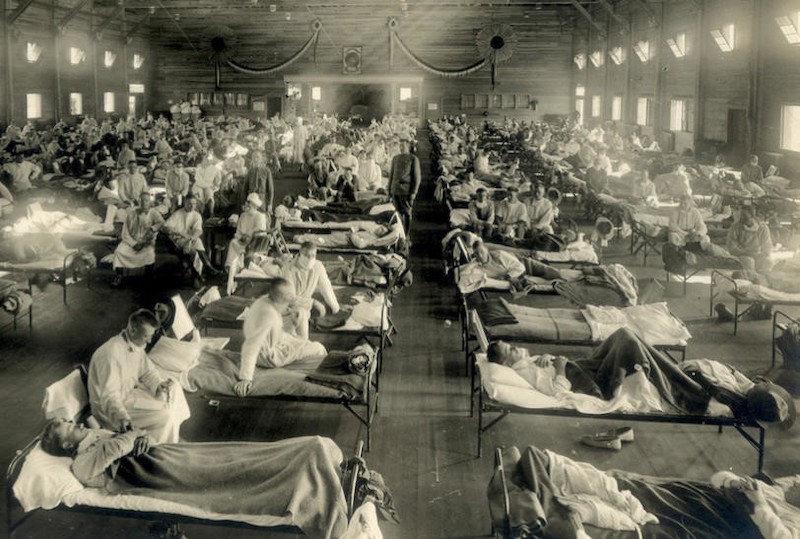[Editor’s note: Tyee contributing editor Crawford Kilian, a long-time
blogger about the political and social implications of particularly virulent flu viruses, will be contributing analysis related to fast unfolding coronavirus events. Having published this, here is the next.]
When I began blogging about the epidemiological implications of flu viruses 15 years ago, H5N1 avian flu was a scary thing and a likely candidate for a pandemic. I knew the word from dark science fiction novels and even earlier tales (see sidebar). And I found early bloggers about flu very concerned with an H5N1 pandemic that would come across the Pacific from China or Vietnam and spread with horrible speed across North America and the rest of the world.
A whole online subculture, the preppers, was dedicated to surviving such a pandemic by holing up with a basement full of caseloads of canned soup and stew and a few carefully chosen firearms. The preppers weren’t expecting zombies in the streets, but they did worry about the unprepared roaming the neighbourhood in search of their next meal, in the absence of police or any other form of government protection.
I didn’t worry about such a chaotic unravelling of society, though a pandemic, should one ever happen, didn't seem like a pleasant experience.
At some point, however, I learned that we have since 1961 been living through the seventh cholera pandemic in 60 years. And WHO’s definition of a pandemic is simply “the worldwide spread of a new disease.” (OK, cholera isn’t a new disease, and it's gone worldwide seven times since 1817. Take it up with WHO’s Director-General, Dr. Tedros.)
That's a pretty boring definition by science-fiction standards. Most people imagine pandemics to be like the Spanish flu, with healthy people boarding streetcars and falling dead within three stops. So when Dr. Margaret Chan, then the Director-General of WHO, declared H1N1 “swine flu” a pandemic, everyone sneered.
H1N1 hadn’t come across the Pacific, but cropped up right here, and then had gone around the world. And it seemed not very lethal, like the old Charles Addams cartoon, where a patent attorney is standing by an open window holding a strange kind of weapon. Looking over his shoulder at the hapless inventor, the attorney says: “Death ray, fiddlesticks. It doesn’t even slow them down.”
H1N1 actually was pretty nasty, but not corpses-in-the-street nasty, and WHO took a lot of criticism for its call. Never mind that it was indeed a new disease that spread worldwide with amazing speed, or that it killed a lot of people in places like India. Life in Europe and North America carried on, while the seventh cholera pandemic (which seemed to draw little global concern) swept Haiti in 2010 and killed a lot of poor black people.
Now here we are with a coronavirus unknown to science even two months ago, widely distributed across a nation of 1.4 billion people and colonizing Canada, Germany, and a lot of other advanced, self-absorbed nations. New disease, worldwide spread into Important Countries — must be a pandemic, right?
I’d wait awhile. The Important Countries’ health-care systems are quite likely to stamp out the viral invader. We saw this virus coming, and we already have its genome. A Hong Kong expert is close to testing a vaccine, and other researchers are hot on his heels. Meanwhile, China itself is behaving like an armoured warrior with a wasp in his helmet. China may concuss itself to rid of the wasp, but it’s mobilizing resources and taking economic damage to stop the outbreak.
If the coronavirus colonies do establish themselves, even Canada could be in trouble. A new modelling study by Chinese experts concludes: "2019-nCoV poses a major public health threat, at least at the level of 2003 SARS.” Toronto took an economic beating in that outbreak, which also shocked (and sickened) its health-care workers. Imposing a travel ban or lockdown on Toronto, Vancouver, or any other Canadian city would be traumatic, whatever the actual case count.
So if human-to-human coronavirus transmission succeeds on a large scale in even a few cities around the world, yes, it will be a pandemic.
But it will still be a pale imitation of the pandemics that depopulated the Americas from 1520 to the late 19th century, killing 50 million people, destroying countless cultures, and leaving the shattered survivors open to expropriation by the colonizers from the Important Countries. Now, those were pandemics. ![]()
Read more: Health, Coronavirus

















Tyee Commenting Guidelines
Comments that violate guidelines risk being deleted, and violations may result in a temporary or permanent user ban. Maintain the spirit of good conversation to stay in the discussion.
*Please note The Tyee is not a forum for spreading misinformation about COVID-19, denying its existence or minimizing its risk to public health.
Do:
Do not: